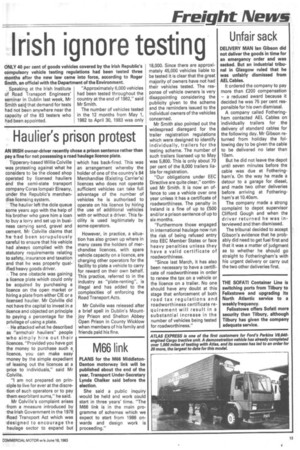Irish ignore testin
Page 15

If you've noticed an error in this article please click here to report it so we can fix it.
ONLY 40 per cent of goods vehicles covered by the Irish Republic's compulsory vehicle testing regulations had been tested three months after the new law came into force, according to Roger Smith, an official with the Department of the Environment, Speaking at the Irish Institute of Road Transport Engineers' seminar in Dublin last week, Mr Smith saiq that demand for tests had not been anywhere near the capacity of the 83 testers who had been appointed. "Approximately 6,000 vehicles had been tested throughout the country at the end of 1982," said Mr Smith.
The number of vehicles tested in the 12 months from May 1, 1982 to April 30, 1983 was only 18,000. Since there are approximately 45,000 vehicles liable to be tested it is clear that the great majority of owners have not had their vehicles tested. The response of vehicle owners is very disappointing considering the publicity given to the scheme and the reminders issued to the individual owners of the vehicles concerned.
Mr Smith also pointed out the widespread disregard for the trailer registration regulations which were designed to identify individually, trailers for the testing scheme. The number of such trailers licensed up to May was 5,800. This is only about 70 per cent of the 8,000 trailers liable for registration.
"Our obligations under EEC Directive are quite clear," continued Mr Smith. It is now an offence to use a vehicle over one year unless it has a certificate of roadworthiness. The penalty in Ireland is a fine of up to £500 and/or a prison sentence of up to six months.
"Furthermore those engaged in international haulage now run the risk of being refused entry into EEC Member States or face heavy penalties unless they have a valid certificate of roadworthiness.
"Since last March, it has also been necessary to have a certificate of roadworthiness in order to renew the tax on a vehicle or the licence on a trailer. No one should have any doubt at this stage that enforcement of both road tax regulations and roadworthiness certificate requirement will result in a substantial increase in the number of vehicles being tested for roadworthiness."








































































































